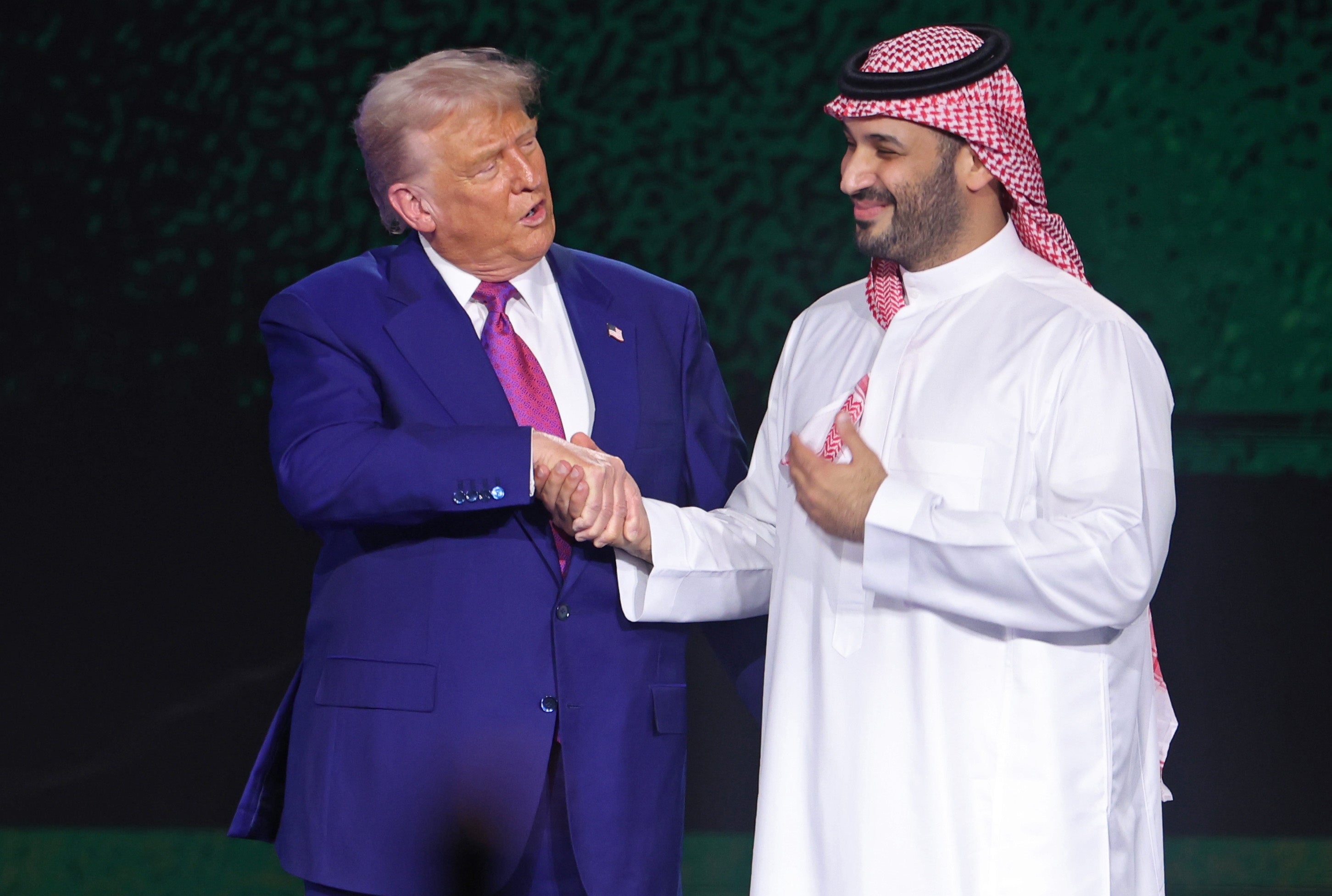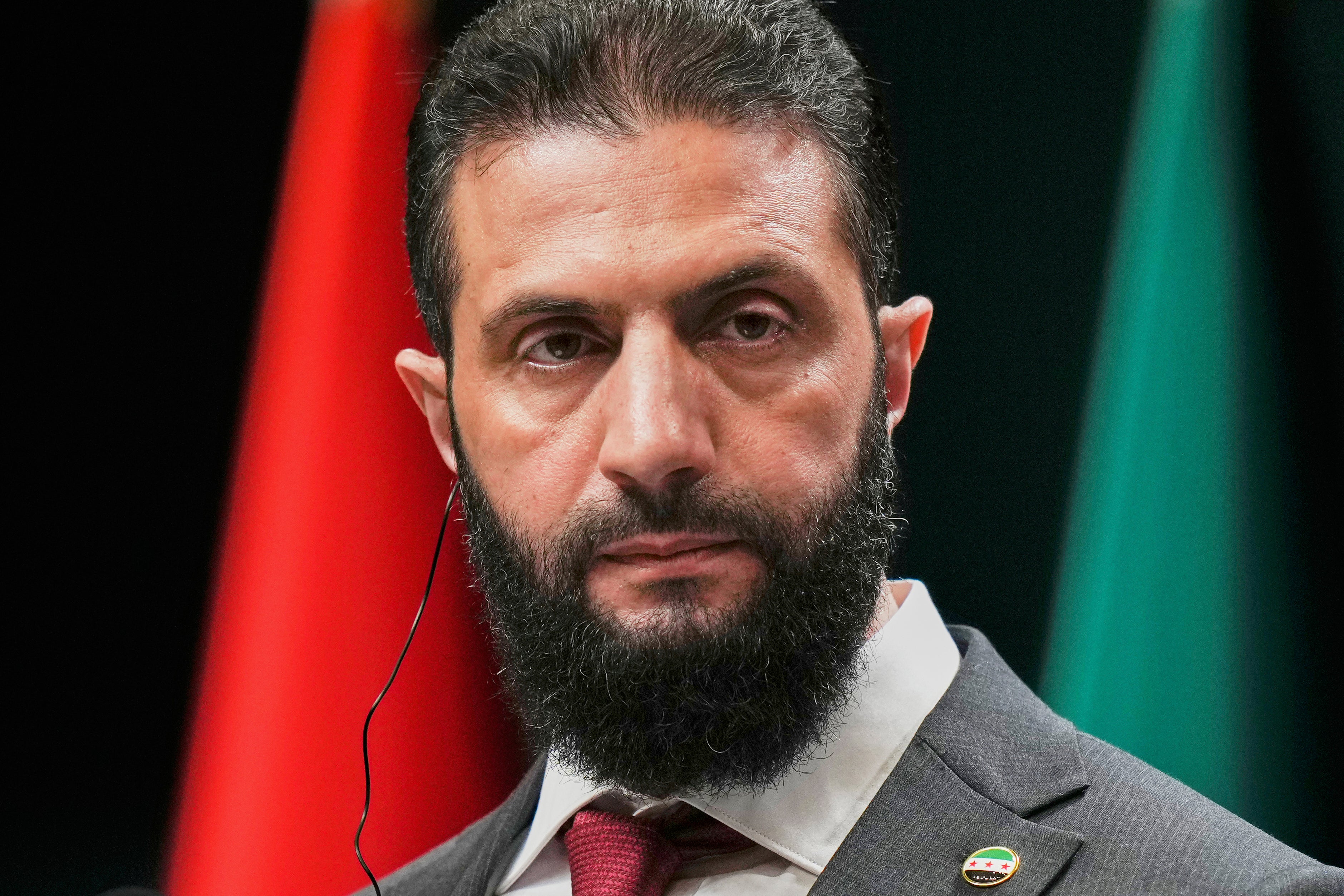President Donald Trump has said he is ordering the lifting of U.S. sanctions on Syria to start the process of normalizing relations between Washington and Damascus in hopes of bolstering the war-torn country’s new government, more than a decade after the Obama administration severed diplomatic ties at the outset of the civil war that ended with the ousting of dictator Bashar al-Assad last year.
Speaking in Riyadh, where he addressed a Saudi-American investment forum on the first day of his four-day, three-country swing through the Middle East, Trump said the new Syrian government “will hopefully succeed in stabilizing the country and keeping peace” after the country’s people had seen “their share of travesty and war” over “many years.”
He told the audience of Saudi and American dignitaries that Secretary of State Marco Rubio will meet with the new Syrian foreign minister in Turkey later in the week, and, citing discussions with Saudi Crown Prince Mohammed bin Salman and Turkish leader Recep Tayyip Erdogan, Trump also revealed that he is ordering “the cessation of sanctions against Syria” to give the new government “a chance at greatness.”
“The sanctions were brutal and crippling and served an important, really an important function, nevertheless, at the time, but now it’s their time to shine. It’s their time to shine. We’re taking them all off,” he said. “So I say, Good luck Syria. Show us something very special, like they’ve done, frankly, in Saudi Arabia.”

Ahead of the president’s speech, a White House official also said Trump had “agreed to say hello” to Ahmed Hussein al-Sharaa — the former Islamic militant leader who has served as Syria’s de facto president since Assad fled the country and took up an offer of asylum in Russia last December — even though Sharaa remains on a list of terrorists maintained by the American government.
Sharaa once fought with al-Qaeda in Iraq after the U.S-led invasion in 2003. He later led the Syrian branch of the terror organization that carried out the 9/11 attacks, before breaking away in 2016 to form what became Hayat Tahrir al-Sham, the group that ousted Assad.
Since coming to power in a blistering offensive last year that swept away the Assad dynasty after it had held sway for more than five decades, Sharaa has promised to deliver an inclusive government until free and fair elections can be held.
Trump’s announcement of an end to more than a decade of harsh economic penalties, which were levied against the former Assad regime as a result of the now deposed dictator’s use of chemical weapons against the Syrian people and other atrocities – came moments after he restated his openness to a relaxation of tensions with the Iranian government.
In his remarks, he offered a rhetorical olive branch to Iran and said the United States wants it to be “a wonderful, safe, great country” if its leaders choose to forswear their longtime pursuit of nuclear weapons. This was the latest in a series of signals meant to de-escalate decades of tensions between Washington and Tehran by reaching a new nuclear nonproliferation agreement, eight years after he threw out the one that was reached under the Obama administration.
Trump contrasted Iran’s economic isolation since the 1979 Islamic revolution with the prosperity that Saudi Arabia has enjoyed over the same time period, during which Riyadh replaced Tehran as America’s main ally in the petroleum-rich region.
“Iran’s decades of neglect and mismanagement have left the country plagued by rolling blackouts lasting for hours a day – all the time you hear about it. While your skill has turned dry deserts into fertile farmland, Iran’s leaders have managed to turn green farmland into dry deserts,” he said.
But the American leader said he had not come to Riyadh to “condemn the past chaos of Iran’s leaders” and instead offered Tehran “a new path, and a much better path, toward a far better and more hopeful future.”

He said he has always been “willing to end past conflicts and forge new partnerships for a better and more stable world,” even with those with whom he has had “profound differences”, such as Iran’s leaders.
“I have never believed in having permanent enemies. I am different than a lot of people think. I don’t like permanent enemies, but sometimes you need enemies to do the job, and you have to do it right,” said Trump, who pointed to America’s history of forging alliances with former adversaries. He told the audience that he would like to do the same with Iran, provided that the Iranian government chooses to cease causing chaos in the region.
“I want to make a deal with Iran. If I can make a deal with Iran, I’ll be very happy if we’re going to make your region and the world a safer place. But if Iran’s leadership rejects this olive branch and continues to attack their neighbors, then we will have no choice but to inflict massive maximum pressure and drive Iranian oil exports to zero like I did before,” he said.
“Iran will never have a nuclear weapon. But with that said, Iran can have a much brighter future,” Trump continued. “The choice is theirs to make. We really want them to be a successful country. We want them to be a wonderful, safe, great country, but they cannot have a nuclear weapon.”
The president’s offer of a relaxing of tensions with Tehran comes on the heels of multiple meetings between American and Iranian negotiators with an eye to an agreement that would take Iran off the path to achieving nuclear weapons capability.
When Trump first came to the presidency in 2017, there was just such an agreement in place. The Joint Comprehensive Plan of Action (JCPOA), a multilateral deal negotiated between Tehran, the five permanent U.N. Security Council members, Germany and the European Union provided for the lifting of sanctions imposed as a result of Iran’s pursuit of nuclear weapons technology, in exchange for strict limitations on Iranian nuclear research and power capabilities and inspections of nuclear facilities by the International Atomic Energy Agency.
The agreement, which followed years of painstaking talks, was part of an effort by the Obama administration to open dialogue with the longtime U.S. antagonist. Iran was once one of America’s closest allies in the Middle East region, with a pro-Western and largely secular government under the Pahlavi dynasty. But Washington and Tehran have not had formal diplomatic relations since April 1980, when the U.S. cut ties and imposed an economic embargo in the wake of the 1979 seizure of the American embassy and the resulting 444-day hostage crisis.
Trump entered office opposed to the deal because it was negotiated in part by his predecessor, Barack Obama, and with further prodding by Israeli and Saudi leaders, he eventually pulled the U.S. out of the agreement.
Now, eight years on from his decision to withdraw from the JCPOA and impose a “maximum pressure” sanctions campaign against Tehran, his administration is pushing for a new deal that would, in principle, reinstate much of what was in place under the old deal.
But Trump warned that Iran’s window for negotiating with Washington, even indirectly, will not be open for long. He explicitly stated that his offer “will not last forever” and said that the time for them to choose is “right now.”
“We don’t have a lot of time to wait. Things are happening at a very fast pace. Happening right here. They’re happening at a very fast pace. So they have to make their move right now – one way or the other, make your move,” he said.
With reporting by Richard Hall

